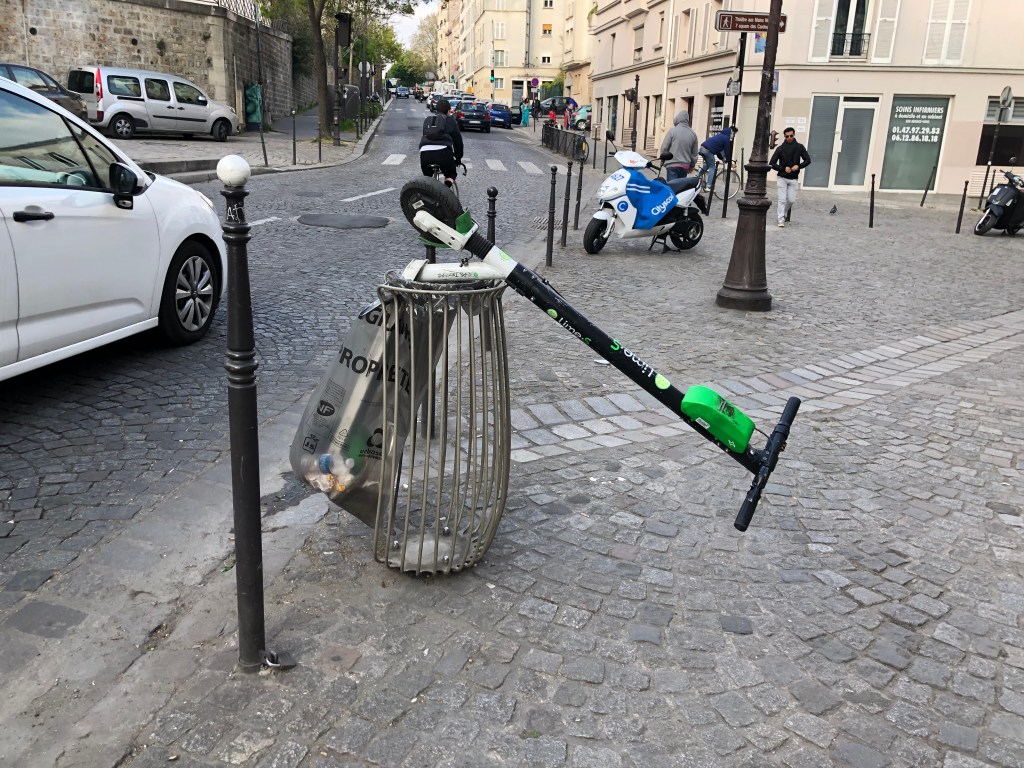In a major blow to shared micromobility companies Lime, Dott and Tier, Paris has voted to ban rental e-scooters from its streets. Many in the industry fear the move in Paris, where free-floating scooters initially took off in 2018, will have ripple effects in other cities.
Paris has been one of the most heavily regulated e-scooter markets, something companies have pointed to as an example of how they can play nice with cities. Yet, despite limiting scooter top speeds to as slow as 10 kilometers per hour (about 6 miles per hour) and requiring riders to use dedicated parking areas or pay fines, Paris has become the first city to completely reverse its policy on offering contracts to shared micromobility companies.
In a referendum on Sunday organized by Paris mayor Anne Hidalgo, Paris residents voted 89% against keeping shared e-scooters in the city. The three companies that pay for contracts to operate in the City of Light will have to pull their fleets — a total of 15,000 e-scooters — out of the city by September 1.
Hidalgo, who originally welcomed shared e-scooters to Paris, has pushed for the city to become a more livable 15-minute city and has spearheaded policies that reclaim parking spots from cars to create new bike lanes and pedestrian-friendly areas. However, shared scooters have gotten a lot of pushback from many city residents who often complain about reckless driving and clutter on sidewalks.
Hidalgo said on Sunday that scooters are the cause of a lot of accidents and that the business model was too expensive to be sustainable, with a 10-minute ride costing about €5. She also said free-floating scooters aren’t as climate friendly as she’d want. At the start of the year, TechCrunch dived deep into scooter usage in Paris and found through a variety of studies that while e-scooters are incredibly popular, they mostly replace walking or public transit rather than car usage.
That doesn’t mean they didn’t replace any car trips. One study from 2019 found 7% of kilometers covered by scooters replace car and personal taxi trips, a number that has likely grown over the years. But 7% is not nothing, says Hélène Chartier, director of urban planning at C40, a global network of mayors taking urgent climate change action. Chartier previously served as an advisor to Hidalgo.
“As part of a mobility package that Paris would offer as an alternative to cars, [shared e-scooters] could have been an option,” said Chartier. “Without all of the other problems, they could have said, ‘Ok why not?’ But if you add the accidents, if you add the difficulty on the public space, at some point, you need to say this is not the main solution. We should invest more in bikes, e-bikes, walking.”
Low voter turnout
David Zipper, a visiting fellow at the Harvard Kennedy School’s Taubman Center for State and Local Government, tweeted that he wasn’t surprised to see Paris vote against shared e-scooters, but he didn’t expect such a large margin. That sentiment has been mirrored by scooter advocates and the companies themselves.
Dott, Lime and Tier said in a joint statement that the low voter turnout affected the results of the referendum. Only 103,084 people turned out to vote, which is about 7.5% of registered Paris voters. They blamed restrictive rules, a limited number of polling stations (and thus long lines that dissuade young voters) and no electronic voting, saying the combination “heavily skewed toward older age groups, which has widened the gap between pros and cons.”
Additionally, the companies said the referendum was held the same day as the Paris marathon, and that only residents of the city were allowed to vote, leaving out those who live just outside the city but commute in.
The operators offered free rides to customers who voted Sunday and relied on social media influencers to try to get young users to vote, efforts that seem to have gone in vain. Parisians reported there were a high proportion of older voters in the queues.
The referendum isn’t binding, so Hidalgo can still make the unlikely decision to keep scooters in the city based on the low voter turnout. The numbers clearly show that scooters are popular. Lime has previously told TechCrunch that 90% of its fleet in Paris is used every day. In 2021, over 1.2 million scooter riders, 85% of whom were Parisians, took a total of 10 million rides across Lime, Dott and Tier. That’s around 27,000 rides per day.
The ban will not have an effect on the e-bikes offered by shared micromobility companies, which will remain in the city. Similarly, privately owned scooters are not affected by the ban, of which 700,000 were sold in France last year, according to transport ministry figures.































Comment